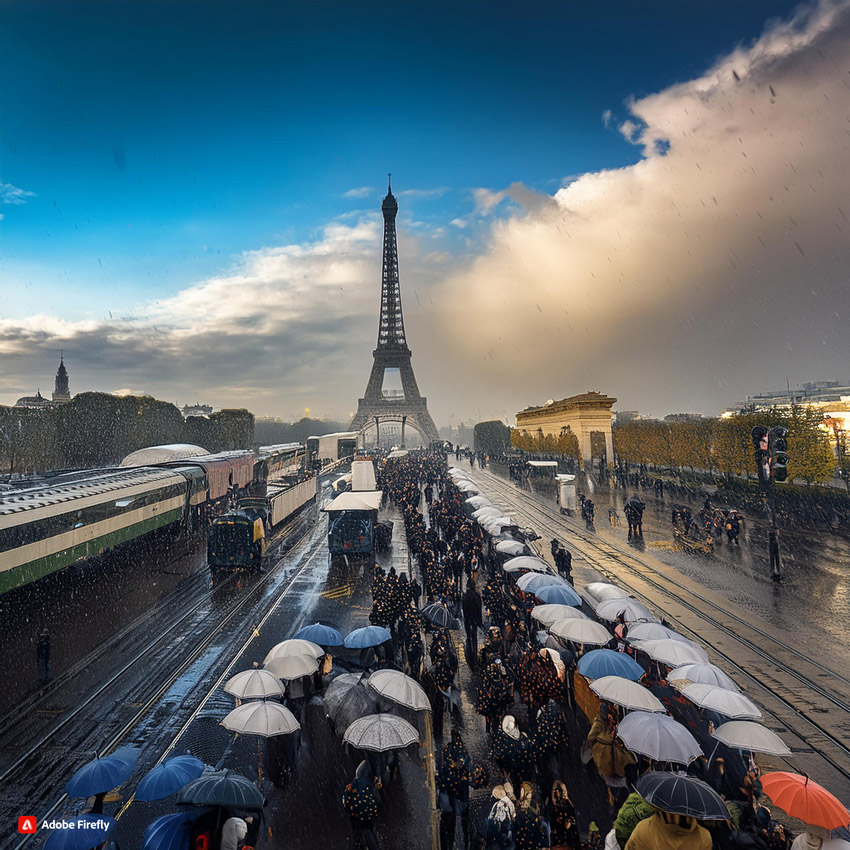Wednesday, July 31, 2024
Reading Time: 3 minutes

A significant disruption occurred in the travel plans of thousands of individuals due to a local storm on Wednesday. This natural event interrupted all high-speed train traffic connecting Paris to the southeast of the country and Switzerland in both directions. France’s national rail company, SNCF, reported this disruption, which coincided with the ongoing Olympic Games and the peak of summer vacation departures. The incident underscores the vulnerability of transportation networks to extreme weather conditions and the subsequent ripple effects on global travel.
Immediate Consequences
The storm caused a tree to fall on the tracks, which was then struck by a train in Burgundy, southeast of Paris. This incident led to the immobilization of all high-speed trains departing from and arriving at the Gare de Lyon station in Paris. In contrast, regular-speed trains, which operate on separate tracks, remained unaffected by this event. The SNCF immediately cut power to the affected track and initiated logging operations to remove the fallen tree. However, initial assessments indicated that the resolution of the issue would not be swift. Consequently, the SNCF began the process of bringing all stranded trains back to the nearest stations to assist passengers in finding alternative modes of transportation.
Weather Warnings and Historical Context
The disruption came on the heels of a significant sabotage event the previous week, which had already severely disrupted France’s train traffic ahead of the Olympic Games’ opening ceremony. High-speed train services had only been fully restored earlier in the week, emphasizing the fragility of the transportation network in the face of both human and natural disruptions.
Meteo France, the national weather agency, had issued warnings about the risk of “locally strong” thunderstorms, including heavy rains and wind, across most French regions on Wednesday. The Paris region was placed on a lower level of a three-tier storm warning scale, while most parts of central and southeastern France were on the middle level. Additionally, France was experiencing a heatwave, with temperatures in Paris reaching 31 degrees Celsius (88 degrees Fahrenheit) for the third consecutive day.
Broader Implications for the Travel Industry
The incident highlights several critical points for the travel industry:
- Infrastructure Vulnerability: The vulnerability of transportation infrastructure to natural events can lead to significant disruptions in travel plans, especially during major international events like the Olympics.
- Alternative Travel Solutions: The importance of having contingency plans and alternative travel options becomes evident in such scenarios. Rail companies and other transport providers need to have robust strategies to assist passengers during unforeseen disruptions.
- Weather Impact Awareness: Travelers and the travel industry must stay informed about weather forecasts and potential impacts on travel plans. Proactive communication and planning can mitigate the adverse effects of such disruptions.
Future Considerations
For travelers, this incident serves as a reminder to:
- Stay Informed: Regularly check weather forecasts and travel advisories, especially when traveling during major events or peak seasons.
- Flexible Planning: Have flexible travel plans and be prepared for potential delays or changes. This includes knowing alternative routes and transportation options.
- Insurance: Consider travel insurance that covers disruptions caused by natural events, ensuring some level of protection and assistance in case of emergencies.
The disruption of high-speed train services in Paris due to a local storm had a substantial impact on thousands of travelers. This incident not only affected those heading to the Olympics but also highlighted the broader implications for the travel industry. The need for resilient infrastructure, effective contingency planning, and proactive communication is paramount to minimizing the impact of such disruptions on global travel.



